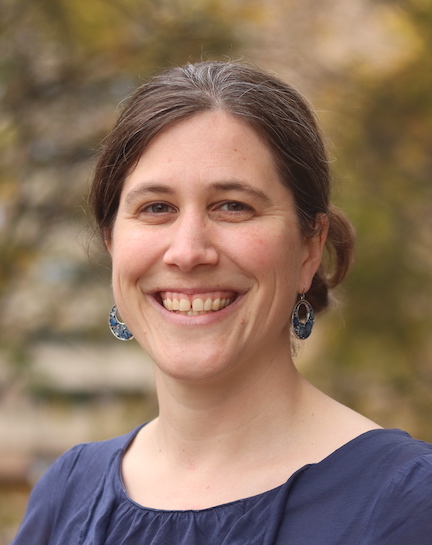Meet the Facilitation Team

Christina is a mathematician who strayed into the world of teaching computing skills to researchers and hasn't looked back. She believes computing is for everyone (not just people who have done it for a long time) and loves to facilitate 'lightbulb' moments where someone learns something new.

Amber is a computational solid state chemist who dabbles in Julia code. She has taught a broad range of students, from high schoolers to academic researchers, and she aims to make computing accessible to researchers of all backgrounds.

While earning his PhD in Chemistry, Andrew became the go-to person for research computing questions, despite being a self-taught programmer with no computer science background. Andrew brings a penchant for writing guides, troubleshooting, and translating technobabble.

Danny is a computational biologist turned research computing facilitator. He works with researchers to design and run scalable, high-throughput computing workflows—and is especially committed to making these tools more accessible to the life sciences.

Mats Rynge is a Senior Computer Scientist in the Scitech group at the University of Southern California’s Information Sciences Institute. His work focuses on developing and supporting research cyberinfrastructure, including the PATh Facility, the OSPool, and the Pegasus Workflow Management System. He also helps guide cyberinfrastructure for NSF Major Facilities through the CI Compass project.
What We Do
To help researchers effectively utilize computing resources, our Research Computing Facilitators (RCFs) not only guide the implementation of computational work on PATh-supported compute capacity, but can also point researchers to other national services related to research computing and data needs.
Talk to Us
Learn More about Our Approach
Regular Activities
We are available to answer questions via an email “ticket” system. We aim to provide a first response (although not necessarily a solution!) within 1-2 business days.
Email Us
In addition to email, we host drop-in “office hours” online twice a week.
- Tuesday
- 4 - 5:30pm ET / 1 - 2:30pm PT
- Thursday
- 11:30am - 1pm ET / 8:30 - 10am PT
No appointment is needed, just show up during the available times! Contact us for the zoom link.
All of these details are also on our Get Help page.
Get Help
Training
The Facilitation Team offers monthly training sessions for the HTC community. Upcoming training events are announced via the OSPool users email list and are listed on our monthly training page. The Team also organizes and hosts an annual in-person summer school, the OSG School.
Monthly Training
Annual OSG School
Other Events
Are you hosting an event where the audience might benefit from our services? We are happy to give guest presentations or trainings for your organization or event. Let us know at [email protected]
Our Philosophy
Drawing upon the principles of Research Computing Facilitation (RCF) pioneered by UW-Madison’s Center for High Throughput Computing, the Facilitation Services team work to expand the impact of dHTC and dHTC Facilitation across various PATh stakeholders, including researchers, multi-institutional collaborations, and the campuses and organizations that support them. These principles include:
- proactive engagement
- personalized guidance
- technology agnosticism
- ‘teach-to-fish’ documentation and training methodologies (empowering participants to realize dHTC impacts for themselves)
- prioritization of “research performance” over computing performance, and
- advocacy for user-centric improvements to relevant technologies.
PATh Research Computing Facilitators apply these principles to the practice of dHTC Facilitation for researchers, research groups, and multi-institutional collaborations leveraging the dHTC environment of the OSG via access services like the [OSG Portal](https://portal.osg-htc.org) (available to researchers affiliated with any US-based academic, government, or non-profit organization). For example, all new users of the OSG-Operated Access Points first meet with a Facilitator to collaborate on an efficient on-ramp plan and anticipated impact, with accessible ongoing support.
Facilitation for Campuses
Leveraging the same principles and a history of experience with researchers, the RCF team also facilitates the navigation of PATh services for staff at campuses (including NSF CC\* awardees) and other organizations looking to enhance their dHTC capabilities, whether by growing local dHTC capacity and support, or by connecting local resources and end-users into the OSG. As part of the services for campuses, the RCF team also leverages its own experience in dHTC for end-users to offer dHTC Facilitation training via shadowing, workshops, and ongoing support channels.
Taking dHTC Impact Farther
As an ultimate principle of Research Computing Facilitation, insights from the facilitation of dHTC stakeholders are continually integrated across PATh areas to improve dHTC capabilities and services. These include improvements to strategies for Community Empowerment, where our RCFs also contribute significantly to the materials and execution of PATh’s various outreach, education, and training programs. As part of the services for campuses, the RCF team leverages its own experience in dHTC for end-users to offer dHTC Facilitation training for personnel at campuses.
